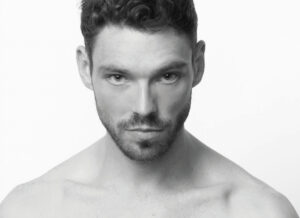Julian Clary serves up a dinner to die for in Le Grand Mort
It all started with serial killers. Well, sort of. It was 1987 and Julian Clary was performing at iconic Sydney bar and cabaret venue Kinselas. Theatre director Christopher Renshaw saw Clary’s act and the pair became friends, bonding over a shared interest in this most macabre of subjects – so much so that Renshaw began looking for a project they could work on together that would scratch this rather grisly itch. It would be another 30 years before his ambition was realised.
Le Grand Mort, which makes its world premiere at Trafalgar Studios this month, ‘isn’t actually about serial killers’, the director explains, ‘but it’s born from that – it’s a black comedy about death, murder, love, loneliness’. The play opens with Michael, played by Clary, preparing dinner in his stylish Notting Hill kitchen, and awaiting the arrival of Tim, a beautiful young visitor who may or may not be aware quite what he’s getting himself into.
Clary starred in the Boy George musical Taboo in 2002 (which Renshaw directed), and played the Emcee in Rufus Norris’s production of Cabaret in 2007, but it’s as a standup comedian and television presenter that he’s become a much loved household name. Le Grand Mort was written for him by the late Stephen Clark, who the director had an inkling would be the perfect person to create a role that would make the most of the Clary’s talents as a comic, but also stretch him as an actor. Renshaw introduced Clary and Clark over lunch in 2010: ‘They got on, three years later he produced this extraordinary play.’
 Julian Clary
Julian Clary James Nelson-Joyce
James Nelson-Joyce
JULIAN CLARY – OUT OF HIS COMFORT ZONE
Tackling areas that Renshaw has ‘never heard discussed on stage’, including bad parenting, voyeurism and the salaciousness of the press, Le Grand Mort is not an easy one to describe, he says. ‘You don’t want to put people off. It’s really original and really extraordinary, but it’s out there.’
Clary has been quoted as saying that Le Grand Mort really takes him out of his comfort zone, but the director says that that’s more to do with the journey of the character of Michael than the play’s subject matter. The role sees Clary ‘showing a vulnerability, an emotional side and not relying on what he can do so well, which is comedy’. There’s plenty of humour in the show, but ‘it’s really about Julian revealing a side of himself through the character that’s wounded and vulnerable and emotional. He’s so deft with words, he’s a highly intelligent man and this takes him to an area where there’s a lot of pain revealed in the character.’
DINNER PARTIES – CUE THE BAD BEHAVIOUR
The play is technically difficult too. That opening scene, where Michael prepares dinner for Tim, requires Clary to cook a meal live on stage – one palatable enough for he and his co-star to want to tuck into eight performances a week. Trafalgar Studios audiences will be getting used to the idea of shows set during dinner parties, having watched Stockard Channing preside over an awkward family meal in Alexi Kaye Campbell’s Apologia and with Jordan Tannahill’s Late Company transforming the social ritual into a battleground, but Le Grand Mort is on another level altogether, with the delicious aroma of garlic and anchovies wafting over the stalls. It’s ‘so different to what Julian has ever done; the precision of it’, says Renshaw. ‘It’s a big learn and a big ask.’
The director is excited to see how audiences will respond to Le Grand Mort, relishing in particular its potential to get people thinking about subjects that might never have been on their radar before. ‘I’m hoping that it fascinates, intrigues and enables you to talk about something that you wouldn’t normally talk about.’ Sweetly, Renshaw is also very proud of his collaborators and friends: ‘I really want them to acknowledge the talents of Julian and Stephen,’ he says. ‘Because it’s Julian, you feel safe going there with him.’
Interview by Jo Caird
